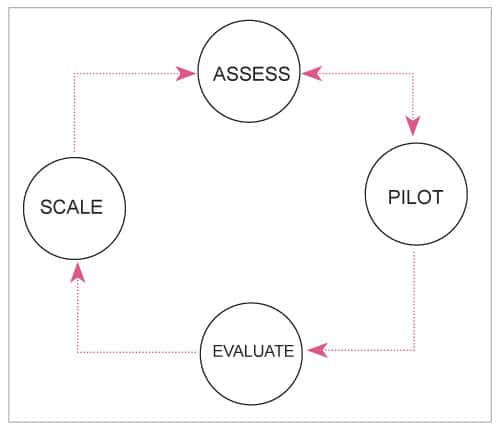DevOps is an end-to-end approach that caters to all aspects of software development and operations. A cultural paradigm in the organisation, it brings development and operations together to achieve the dual objectives of stability and change. The crux of this approach is continuity and automation. This includes continuous integration, continuous deployment and continuous delivery. This article gives an overview of its role in digital transformation.
Before adopting DevOps, the different groups in a company — such as business, IT and operations — worked in silos. In the Waterfall approach to software development, each phase was separated by stage-gates. An example would be the completion of development leading to the starting of the testing phase. In this approach, there were unexpected surprises during the transitioning process. Also, each group had its own tools and systems, leading to a plethora of applications. Virtual walls existed between the different parts of the organisation and there were no proper communication lines, which led to cost and effort overruns.
DevOps tooling for digital transformation
Organisations have a large ecosystem of systems and applications. It’s extremely important that the application technology portfolio meets the expectations of the business. Organisations have the option of building their own internal technology stack or leveraging any cloud provider.
Ever since the rapid adoption of cloud, cloud providers like AWS, Azure and GCP have started providing a number of DevOps tools and services. Organisations can choose a provider or build their own tools/accelerators leveraging the capabilities provided by the cloud provider. This brings an enormous amount of flexibility and provides a great opportunity for transforming the business.

DevOps framework for enterprise adoption
An enterprise DevOps framework is a pluggable shared services model that is completely automated. It scales depending on the dynamic needs of the organisation, leading to enterprise-wide adoption. The framework integrates seamlessly with the current toolset of the organisation.
Enterprise DevOps integrates a business with its IT processes, and includes:
- Business planning
- Feature, user-story and task creation
- Agile development
- Version management
- Unit testing (test driven development)
- Continuous integration
- Continuous build
- Test automation
- Security
- Performance testing
- Configuration management
- Release management
- Continuous deployment
- Continuous delivery
- Monitoring
DevOps adoption has a number of benefits like improved customer satisfaction, reduced total cost of ownership, reduced response times, and higher operational efficiency. Predictive techniques that use AIOps can help prevent DevOps issues, and identify patterns and root causes for greater organisational productivity.












































































